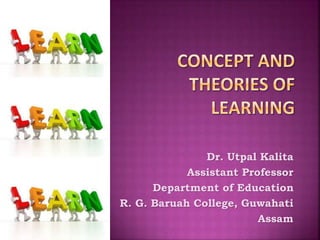
Concept and theories of learning
- 1. Dr. Utpal Kalita Assistant Professor Department of Education R. G. Baruah College, Guwahati Assam
- 2. We the human being are blessed with inborn abilities like intelligence, instincts and aptitudes by our creator. All these abilities are developed in later life according to the situation or environment that we have across in our life. Life is a process of continuous change, modification and improvement of our crude instinctive behaviours. Through which our instinctive behaviours are changed, modified or improved? Welcome to the world of knowledge
- 3. To learn is to modify behaviour. (Percy Nunn) Learning is the modification of behaviour through experience and training. (Edward Gates) Learning is any change in behaviour resulting from behaviour. (J. P. Guilford) Learning is the modification of the reactions of an organism through experiences. (Colvin) Learning is acquisition of habits, knowledge and attitude. It involves new ways of doing things and it operates in an individual’s attempt to overcome obstacles or to adjust to new situations. (Lester D., Crow and Alice Crow)
- 4. Learning is an act of adjustment of individual in his environment. Learning means acquiring new experiences. Learning is always purposive and goal oriented. Learning depends upon physical maturation. Learning is an individual activity. Success or achievement in learning depends upon motivation.
- 5. Habits make learning permanent. Learning is an intelligent activity. Help to adjust in new situation. Help to solve the problems. Help to innovate new things. Learning is a universal activity. Learning is a continuous process.
- 6. Physical Factors Physical fitness, Free from fatigue and boredom, Drill and practice, Age and experience, Food and drink, Method of learning Psychological Factors Goal & objectives of learning, Interest & motivation, Attitude, Aptitude, Emotional condition, Mental health. Guidance
- 7. Environmental Factors Physical/ Infrastructural Facilities, Administrative Skill, Method of discipline, Method of teaching, Teachers’ efficiency Co-ordination between school and home.
- 8. Nervous System: Mental and intellectual development of the children mainly depend on the nervous system. Defective nervous system results abnormal mental development and lack of intelligence. Endocrine Glands: play an important role in different aspects of the children Cognitive and connective behaviour, Psycho-physical activeness, Energetic and enthusiastic activities, Intellectual activeness.
- 9. Psycho-physical Maturity: Learning depends on the maturity of the physical and sense organs of the children Curiosity: Means eagerness to know his/ her immediate physical environment. Putting questions to anybody, anywhere, anytime.
- 10. Learning by imitation Child develops a tendency to imitate activities and behaviours of others. It helps him to learn & acquire experiences of day to day life. Learning by doing Children learn a lots from their own activities. Walking, talking, eating, bathing, using toilet, reading, writing etc.
- 11. Learning through Sense Organs: In the first step Sense organs are the gateways of knowledge. Every living organism has the capacity to react/ respond to the situation or stimulus. The sensory nervous carry the impulse to the respective sensory regions of the brain and then the child become aware of it. This is the sensory experience. In the second step The mind and brain of the children start to give the meaning of the sensory experience. After that, sensory experience has turn into perception or knowledge.
- 12. But perception may be false. False perception is not recognised as knowledge. (Illusion and Hallucination) In the third step Perception is turns into conception with the help of previous sensation. Conception is the organized and integrated result of perception Conception may be concrete or abstract. Learning by Repetition or Exercise
- 13. According to Thorndike, learning is the result of connection or bond established between stimulus and response (S-R Theory) If the initial response to the stimulus is satisfactory, the organism is encouraged or reinforced to repeat the responses again and again. (Trial and Error Method) Connectionism or Reinforcement Theory (E. L. Thorndike)
- 15. Learning is the result of conditioning of the natural response to some other stimulus. Experiment on dog: S1 (Meat) – R1 (Salivation) S2 (Sound of Bell) – R2 (Response to Sound) S1+S2 – R1 (Salivation) Several trial Continued S2 (Bell) – R1 (Salivation) Conditioning Theory (Watson and Pavlov)
- 17. Acquisition of child’s language, Formation of good habit, Formation of attitude in students, Training of the animal.
- 18. It is a slight modification of Pavlov’s conditioning theory. It maintains that response or behaviour of the organism in learning is not mechanical, passive or voluntary but active, purposive and goal oriented. Operant Conditioning (B. F. Skinner)
- 20. Making the objective of learning clear, Learning behaviour be awarded, Proceed from simple to complex, Modification of behaviour Programmed learning method.
- 21. The word ‘Gestalt’ means -‘the surface’ or ‘the configuration’ or ‘ the totality’. The Gestalt psychologist maintain that ‘learning is not blind and mechanical activity.’ It needs the power of insight, mental organization and perceptual ability. The Gestaltists maintained that learning involved in the ability of perceiving or observing the situation as a whole or in its totality. (Insightful Learning Method) Gestalt or Configuration Theory